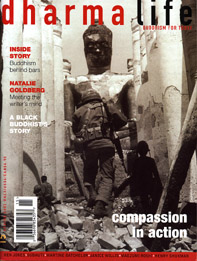When I Find You Again It Will Be in The Mountains
Selected poems of Chai Tao
Trans. Mike O’Connor
Wisdom Books, Boston, $15.95
One day in the early ninth century a young man who had recently given up being a monk to pursue a life in poetry was walking through the streets of the biggest city on earth, pondering a line of verse. He couldn’t make up his mind if the monk in his poem ought to ‘push’ or to ‘knock’ at a gate, and kept muttering the line over to himself. Lost in thought, he bumped into a sedan chair that happened to be carrying the local governor, a man named Han Yu. Han Yu also happened to be a renowned poet, and took an interest in the young poet’s dilemma, waving aside his apologies. ‘Knock’, was definitely the word of choice, the older poet declared. Ever after, the coinage to ‘push-knock’ came to signify the eternal poet’s striving for the mot juste.
So runs the apocryphal beginning of what was to be a fruitful friendship in poetry. The city was Chang-an, capital of the Tang dynasty, and the young poet was Chia Tao, who was to leave behind one of the great legacies of Zen Buddhist poetry. His dates (779-843 CE) coincide with one of the great ages of religious blossoming, when Taoism and Buddhism had germinated to form Ch’an Buddhism, which would later travel to Japan as the original Zen Buddhism. It was also a great age of poetry, with a number of famous poets emerging. Chia Tao was one of a group based in Chang-an known as the ‘bitter-singing’ poets. Their aesthetics valued simplicity above all. He himself became known as a master of ‘ping tan’ – the ordinary and plain.
The poetics called for plain-spokenness, a stripping away of ornament: very much the aesthetic, and philosophical principle, of Zen itself, and one familiar to western readers through such poetic forms as the haiku. Chia Tao himself seems to have eschewed haikus, in favour of longer poems in the ‘old style’ and lu-shih, a then-modern form of eight lines in haiku-like couplets, written in plain style.
Four hundred and four of his poems survive. Almost a quarter are farewell poems, a form into which a good many in this collection fall. Scholars have pointed out that such poems resonated deeply in the Tang era because of the huge distances within the nation, and the inevitable long separations they caused. Many more poems, the core of his oeuvre, concern visits to hermits and monks. The poetry is filled with mountains, mists, hermits’ caves, high peaks. There is a strain of sadness throughout, as if Chia Tao missed his days as a monk.
It is known that he lived in penury and never achieved the status he might have expected. But he was devoted to poetry as a way of life. ‘I have no special names of Buddha to intone; my remaining practice is this verse.’ Each New Year he would place all the poems he had written that year on an altar, sprinkle them with wine, and say to the gods, ‘Here is my heart’s blood for one year’.
He doesn’t write explicitly religious verse yet spirituality infuses his work: the hermits visited, sounds of temple bells and chimes, the practice of meditation, and again and again the mountain mists that suggest deep realisation. They are wonderfully limpid, lucid poems, suffused with simple longing. Their particular delight is that he seldom does more than render concrete details. For page after page we read of geese flying, boats on water, mist on mountains, all delivered without any elaboration; yet without the merest hint from the poet, the concrete details seem magically to acquire tremendous significance. It is partly as if it were all to be read allegorically – as emblematic of the quest for realisation – but also as if everything was seen through a lens that purified and amplified the sight, so things assume a status as abiding mysteries; as if we’re granted glimpses into some transcendent realm, or allowed to see the world through the Enlightened mind of one of Chia Tao’s mountain hermits.
Some of the titles are almost stories in themselves: ‘At I-Chou, Climbing the Tower of Lung-Hsing Temple to View the High Northern Mountains’; ‘Memento on the Departure of a Friend from Yeh, Last Day of the Second Moon’; ‘Evening Gathering at the Residence of Yao Ho; Ko Kung Does Not Arrive.’
This clear and highly readable translation, the fullest of Chia Tao yet to appear, is assisted by an excellent introduction and glossary. And it is a welcome correction to the West’s neglect of an important poet.
Henry Shukman has won several prizes for his poetry in the past year. He is completing his first volume of short stories and working on his third novel



